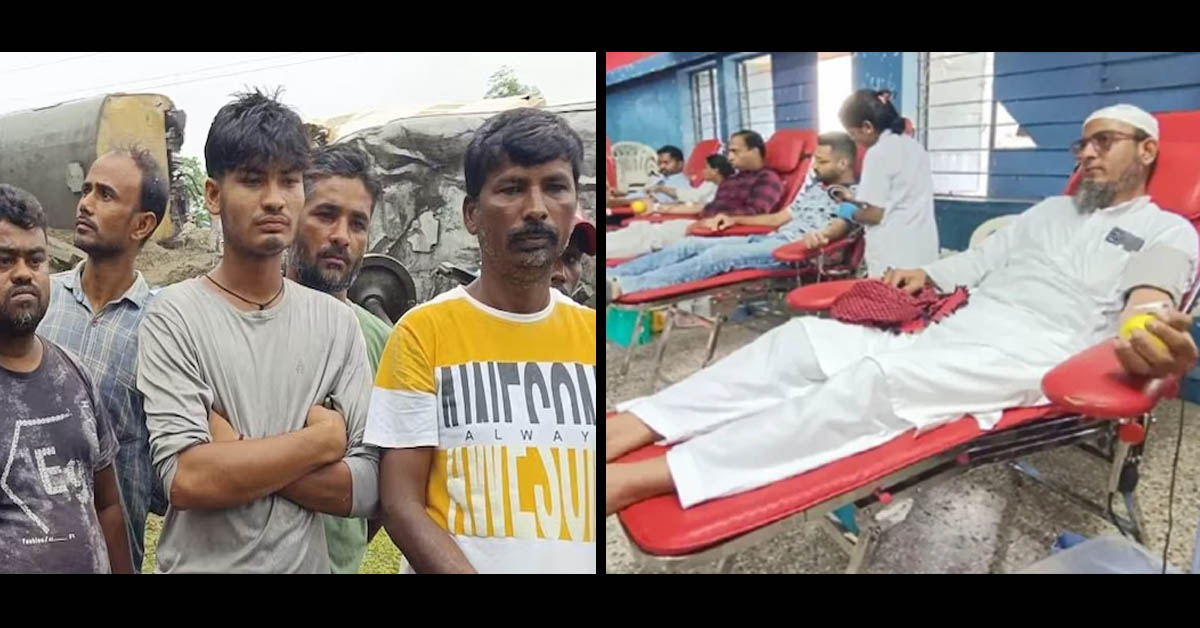Eid al-Adha, known as the “Festival of Sacrifice,” is a time for Muslims around the world to engage in prayer, reflection, and acts of charity. This year, two remarkable stories emerged that not only highlight the spirit of Eid but also underscore the themes of unity, secularism, and compassion. These stories from different corners of India exemplify how the essence of Eid transcends religious boundaries, bringing communities together in acts of humanity and solidarity.
The village of Nirmal Jote in India witnessed an unexpected turn of events on the morning of Eid al-Adha. Residents, who began their day with festive preparations and prayers, soon found themselves in the midst of a rescue operation following a tragic train accident. The collision between a goods train and the Sealdah-bound Kanchenjunga Express resulted in the deaths of at least nine people and injuries to around 40 others. The villagers, led by individuals like Mohammad Momirul, swiftly shifted from celebration to action, embodying the true spirit of Eid through their selfless acts.
As reported by Indian Express, Momirul, a 32-year-old resident, had just returned from offering namaz when he heard a loud crash. Upon reaching the scene, he found the loco pilot of the goods train already dead. Without hesitation, Momirul and over 150 other villagers sprang into action. They organized impromptu rescue operations, using their own vehicles to transport the injured to nearby hospitals in the absence of immediate ambulance services. Many villagers also opened their homes to the passengers, offering them a place to rest and recover from the ordeal.
Among the rescuers was Mohammad Nazrul, who discovered six bodies and helped rescue approximately 35 people. Another resident, Taslima Khatoon, comforted an injured elderly woman who was unable to stand, ensuring she received the care she needed until her relatives arrived. The villagers’ quick response and compassionate efforts not only saved lives but also highlighted the unity and humanity that transcend religious and cultural divides.
The efforts of the Nirmal Jote villagers illustrate how, even in the face of tragedy, the core values of Eid – compassion, charity, and community – shine through. Their actions serve as a powerful reminder that during times of crisis, human solidarity can overcome adversity, bringing people together in the spirit of mutual aid and understanding.
In Pune, another inspiring story unfolded on Eid al-Adha, showcasing a different aspect of sacrifice and compassion. The Muslim Satyashodhak Mandal (MSM), an organization dedicated to promoting modern scientific approaches and democratic values within the Muslim community, launched a unique initiative encouraging Muslims to donate blood and pledge their organs and bodies for medical use after death. This initiative, supported by the Maharashtra Andhashraddha Nirmulan Samiti (MANS) and animal rights activists, marks a significant step towards fostering communal harmony and advancing a scientific outlook.
For the past 15 years, MSM has been organizing blood donation camps on Eid al-Adha, urging Muslims to donate blood instead of sacrificing animals. This year, they expanded their efforts by encouraging participants to sign resolutions for organ and body donation. The response was overwhelming: 34 people donated blood, and around 30 individuals pledged to donate their organs and bodies.
As reported by Indian express, Professor Shamshuddin Tamboli, president of MSM, emphasized that the true meaning of “Qurbani” (sacrifice) lies in contributing to society. By promoting blood and organ donation, MSM aims to save lives and foster a spirit of humanity and communal harmony. Altaphusen Ramjan Nabab, a mechanical engineer and MSM office bearer, highlighted the importance of this initiative, noting that Islam allows for such life-saving acts and that this effort can help dispel misconceptions about Muslims.
The initiative also saw participation from individuals with personal stories of resilience and advocacy. Shrirupa Bagwan, a dedicated MSM member, expressed her joy in donating blood and pledging her body for donation. Nisar Sikandar Bagwan, a father whose daughter faced a triple talaq at a young age, has been a consistent blood donor at MSM’s Eid al-Adha programs for the past eight years. His daughter’s journey from a victim of triple talaq to a law graduate, supported by MSM, underscores the transformative impact of such initiatives on individual lives and the broader community.
The efforts of MSM and the participation of individuals like Nabab, Shrirupa, and Nisar highlight a profound commitment to social reform and communal harmony. By choosing to celebrate Eid al-Adha through acts of donation and sacrifice for the greater good, they are setting a powerful example of how traditional religious practices can evolve to address contemporary societal needs.
These stories are reminders of the potential for religious festivals to serve as platforms for positive change. Eid al-Adha, with its emphasis on sacrifice and charity, provides an ideal opportunity for communities to come together, transcend differences, and work towards common goals. Whether through immediate crisis response or long-term social initiatives, the essence of Eid lies in fostering a sense of shared humanity and mutual support.
Related:
Unity in Diversity: Tamil Nadu’s communal harmony shines bright in a divided nation
From Punjab to Lakshadweep: Heart-warming stories of everyday unity and harmony

